In many red-leaning states around the country, lawmakers have proposed modifying or ending tenure. In my home state of North Carolina, House Bill 715 was under consideration but appears to be stalled. Bills in other states have also been sidelined, at least for now. But the persistence of these attempted reforms, alongside growing conservative distrust of academia, suggests more tenure battles ahead.
The arguments against tenure run the gamut. Some policymakers worry about complacent faculty coasting by with scant contributions to teaching and research. Others worry about long-term costs, the creation of a caste system between overworked contract professors and overpaid tenured dons, and the inability to shift university resources as the interests and priorities of students change. And, of course, many lawmakers are quick to point out that few other professions enjoy the kind of protections afforded to tenured faculty.
As a fixed-term professor in a professional school, I’ve had my doubts about tenure’s value.Advocates for tenure point to its vital role in securing academic freedom, allowing faculty to pursue controversial lines of research and argument without worrying about arbitrary dismissal. Tenure also plays a role in attracting talent and allowing universities to trade off paying lower salaries to talented scholars and researchers in return for job security and intellectual freedom.
I have long been intrigued by the question of whether tenure truly works as a means of promoting academic freedom and intellectual curiosity. As a fixed-term professor in a professional school, I’ve had my doubts about tenure’s value, based mainly on the fact that I know plenty of professors with tenure who still self-censor on important topics.
As someone who speaks out frequently on public controversies in higher education, I am frankly frustrated to see tenured professors note the importance of academic freedom while failing to use it. If I have academic freedom to speak out without the benefit of tenure, why do others need tenure to refrain from speaking freely? Also, as someone who has been labeled an “outspoken conservative,” I know that supporting tenure risks going against my political tribe. Finally, coming to academia from decades in the corporate world, where the risk of being fired or laid off is the norm, I find it odd to hear claims that this one group of workers is special and should be immune to responses to the marketplace.
But one of the hallmarks of academic life is that our existential purpose is the search for truth. To do so, we ought to be guided by evidence more than intuition. Therefore, I decided to look at whatever data I could to help settle some of these questions. I figured FIRE (the Foundation for Individual Rights and Expression) might have such information, and, sure enough, the data are there in FIRE’s Scholars Under Fire database. This data warehouse “documents the ways and reasons that scholars have faced calls for sanction; how scholars and institutional administrators have responded to different forms of targeting; and what (if any) sanctions scholars have ultimately faced in response to these targeting incidents.” The data I consulted specifically cover the period from 2000 to June of 2023, and I boiled my analysis down to three basic questions:
- Does tenure increase the likelihood that a professor is willing to speak up? Enhancing academic freedom and free expression is the main claim for tenure. Do those who have that protection speak up more than those who do not?
- Is tenure effective at protecting those who have it? The protection ostensibly offered by tenure should mean that tenured faculty are less likely to lose their jobs in the face of pressure campaigns, although they might suffer other penalties. Are they less likely to be terminated?
- Does tenure protect moderate and conservative professors more than liberal professors? The push to eliminate tenure is coming from conservative politicians. However, a thoughtful claim has been made that getting rid of tenure will put conservative and moderate professors at greater risk, because it will then be easier for left-leaning administrators to fire them. Can we see evidence for this in the FIRE data?
Findings
1. Does tenure increase the likelihood that a professor is willing to speak up?
As a starting point, FIRE’s faculty survey found that 62 percent of fixed-term faculty were extremely or very likely to self-censor, versus 54 percent of tenured/tenure-track faculty. So the evidence begins to support the idea that tenure does make some difference in willingness to speak up.
Another way to investigate this would be to look at the data and see if tenured professors were targeted for sanctions more than fixed-term faculty (tenure-track faculty are in a middle-ground limbo, so I am going to focus primarily on the two extremes).
The evidence begins to support the idea that tenure makes some difference in faculty willingness to speak up.The answer is yes. Though attempted sanctions don’t track perfectly with faculty speaking out, FIRE’s data are nevertheless a decent proxy. And they reveal that tenured professors speak up at a higher rate than non-tenured professors. Of course, there could be reasons other than tenure why those with tenure are more likely to speak up and risk sanctions. They are more senior and therefore may have opinions that are disproportionately likely to upset students or younger faculty. Or they may assume that the campus environment still allows professors to speak out freely, as may have been the case earlier in their careers. In any case, as you can see from the data, compared to their overall percent representation in the workforce (based on the 2021 figures in the IPEDS database), tenured faculty field a higher percentage of sanction attempts than non-tenured professors.
Tenured professors made up 24 percent of the U.S. professor population in 2021 yet faced 58 percent of the sanction attempts. Fixed-term faculty, on the other hand, comprised 68 percent of professors yet were targeted in only 33 percent of the sanction attempts.
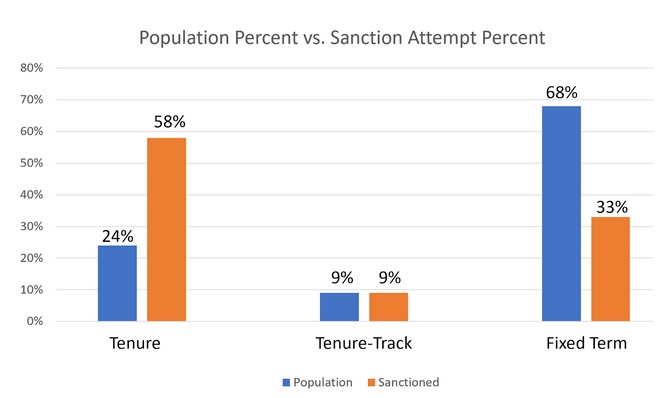
2. Is tenure effective at protecting those who have it?
Tenure does seem to protect those who have it, at least to some extent, from suffering a successful sanction (59 percent for tenured faculty vs. 77 percent for fixed-term faculty). More importantly, however, tenure offers significantly greater protection from termination. Tenured faculty have a 16 percent termination rate when targeted for sanctions, while fixed-term faculty have a termination rate of 53 percent.
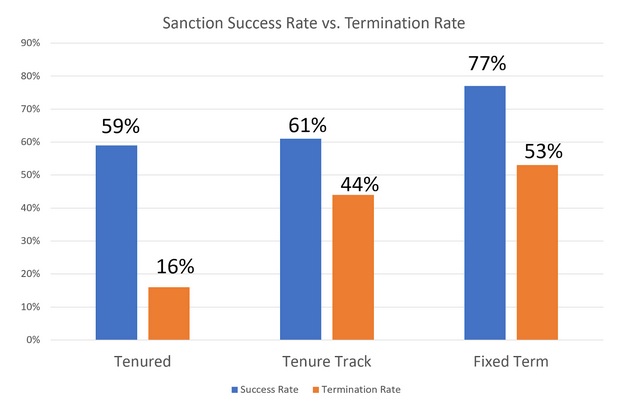
To expand on the above, terminations are but one type of sanction. There are several others, including mandatory “training,” suspensions, and demotions. Sometimes, faculty nearing the end of their careers will decide that resignation is better than staying in an institution at which they are a persona non grata. You can see from the two pie charts below that, when a sanction is successful, a tenured faculty member is less likely to suffer termination (17 percent of total negative outcomes) and more likely to be sanctioned via other means, the most likely outcome being suspension. However, fixed-term faculty were terminated 48 percent of the time, followed by suspensions at 23 percent as the second most likely penalty. Again, from the data, it is clear that tenure provides protection against termination, even while it leaves other potential sanctions as a possibility.
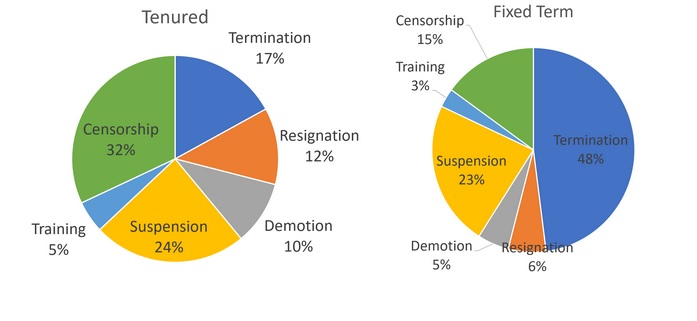
3. Does tenure protect moderate and conservative professors more than liberal professors?
Yes. For starters, there are more sanctions from the left against tenured faculty than from the right (see below). 55 percent of sanction attempts came from the left (352 attempts) versus 39 percent (239 attempts) from the right, with 6 percent coming from neither side (40 attempts).
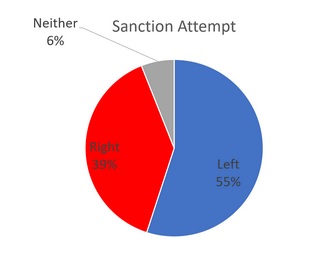
Furthermore, the success rate of sanction attempts from the left (see below) is higher (231 out of 352, or a 66 percent success rate) than those from the right (112 out of 249, or a 45 percent success rate). Also, the termination rate for attempts from the left is higher (50 percent) than that of those from the right (33 percent).
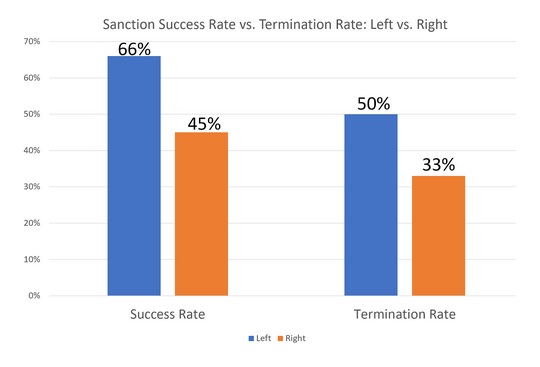
Takeaways
In sum, tenure does matter for academic freedom. If conservative politicians want to encourage diversity of thought and protect the minority of moderate and conservative professors in academia, tenure is an important asset.
- Tenure does appear to enable tenured faculty to speak out more freely and is therefore a key enabler of academic freedom.
- Tenure does protect those who have it from termination. There are other sanctions that faculty might face, but protection from termination is very important.
- Given that calls for sanctioning faculty are now more likely to originate on the left (and are therefore more likely to target moderate liberals, moderates, or conservative faculty), taking away tenure makes faculty with minority views more vulnerable to sanctions, especially termination. Conservative politicians’ efforts to eliminate tenure may backfire, leading to a more liberal faculty and less ideological diversity. Legislators should recognize tenure as an important asset in the fight for a more open and intellectually diverse university.
Tenure is a necessary but insufficient condition for free expression on campus.Even strong advocates for tenure have long acknowledged that it is a necessary but insufficient condition for free expression on campus. FIRE’s faculty survey found that “91 percent of all faculty said they are at least somewhat likely to self-censor on social media, in meetings, in presentations, and/or in publications.” Besides formal sanctions, faculty are also very concerned about social ramifications for offering opinions contrary to the academic mainstream.
Per the above survey, “When it came to freedom of speech, one-third (of faculty) said it is acceptable to restrict speech ‘only where words are intended to be hateful,’ and an additional 15% said we should ‘protect against hate speech even if this restricts speech not intended to be hateful.’” Since “hate speech” is in the eyes of the beholder and is a term that can be very broadly applied, those findings are concerning.
Keeping tenure is important for academic freedom. It should be matched by a willingness to challenge campus cultures that remain too intolerant of heterodox ideas and viewpoints. The protections of tenure will be stronger if faculty regularly exercise not just the privilege of academic freedom but the responsibility of speaking truth, even when it discomfits their colleagues.
Mark McNeilly is a professor of the practice of marketing at the UNC Kenan-Flagler Business School. The views expressed are his own and are not meant to represent the University of North Carolina-Chapel Hill.

